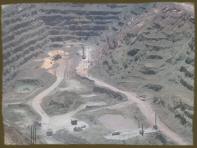Botswana Diamond Centre to Auction Rough, Be On Par with Other Centers
August 27, 08 by Ronit Scheyer
Plans for a diamond center in Botswana have been in the works for some time. As a tangible step, Dr Akolang Tombale was appointed in the spring to coordinate the establishment of a diamond hub in Botswana one that, in theory, would rival the likes of Dubai, Ramat Gan and Antwerp.
Tombale is a Botswana diamond veteran. Most recently, he served as chairman of the board of directors of the De Beers/Botswana 50/50 joint venture Debswana and was also the permanent secretary in the Ministry of Minerals, Energy and Water Resources.
“Now is the time for Botswana to start an independent marketing program,” Tombale told IDEX Online – different from the De Beers’ model of rough marketing.

The Orapa Mine in Botswana |
According to this new model, the rough goods will be sourced from Debswana and smaller producers within Botswana such as Diamondex and Gem Diamonds, and from “outside sources,” meaning other southern African countries. These diamonds will then be auctioned, as opposed to a Sightholder model.
Botswana relies heavily on revenue from its diamond mining activity – approximately one-third of the country’s gross domestic product and about 70 percent of its export earnings come from diamond revenues. The country’s heavy dependency upon those resources presents a challenge its leadership has begun to recognize.
Thus, the proposed diamond center has its roots in the need to create a sustainable market whose survival will be ensured well beyond the limited life spans of Botswana’s diamond mines – namely to stimulate economic diversification and ensure revenue stability, which simply relying on revenues from diamond mining does not give the country. Botswana, Tombale explains, “has very little in the way of a downstream industry,” and a diamond center in Botswana is meant to address this issue specifically.
The proposal aims to create a center with four main attributes, all directly related to “the downstream processing of diamonds,” as he calls it: (1) a rough and polished trading center; (2) a cutting and polishing center, (3) a jewelry manufacturing center and (4) ancillary services to the industry, such as technology, diamond-related IT and more.
The first two attributes rely most heavily on the country’s mining industry, but also move away from it. This also, according to Tombale, provides the most important incentive to companies to trade and establish other activities in Botswana. “We have the direct supply, which is a big ‘industry-specific’ incentive for establishing diamond trading in Botswana,” he says.
“We will hopefully see polished diamonds being traded in Botswana that were not polished locally,” Tombale says, which, with additional manufacturing, trading and ancillary services to the industry will support the center’s viability.

Botswana's Jwaneng Mine |
This will lead to more industrialization in Botswana and its diamond industry. But this is not enough. “We must also find ways to improve profitability for these companies, to give them diamond-specific fiscal incentives to do business here.” One of the main ways they are exploring helping to increase the viability of these operations is through tax benefits offered on the basis of training specifically. In general this translates to making the tax system as attractive as possible for these companies.
Training local diamond polishers, he admits, is the biggest challenge, a statement Kaushik Mehta, chairman of Eurostar, echoes. Eurostar is one of 16 DTC Botswana Sightholders that have established manufacturing operations in the country.
Mehta says that any tax incentive the government offers at the present is meaningless, as they are not making any profit in Botswana. It costs Eurostar a steep $3,000 to train each worker in their factory, and, although the government helps with this, “some additional assistance would be helpful,” Mehta says.
Eurostar’s chairman would also like to see assistance from the government to protect the company in the instances of trained polishers (whom Eurostar paid $3,000 to train) leaving Eurostar to work other factories.
Yuval Kemp, Dalumi Group’s manager of marketing and business development, another Botswana Sightholder, agrees: “Training is the main issue in Botswana. There is no trained workforce (for diamond polishing) in the country.”
Kemp also notes they have indeed heard that the government is offering tax write-offs for training local workers. However, he explains, as polishing in Botswana is not profitable for Dalumi at present, in the short term, tax breaks, on profit tax for example, are not helpful at all.
“With everything it takes to set up in Botswana – building up the business and the machinery and the training, our investment in the country is a long term one. Considerable investment in training, and, although not helpful now, further benefits for training would be an incentive for us,” he concludes.


